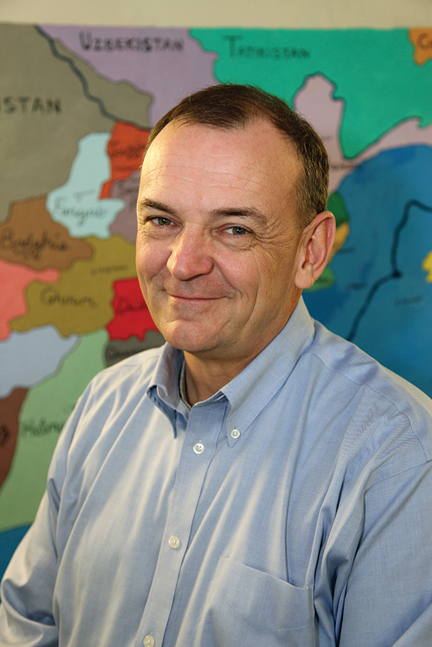War News Radio Gets New Mentor

Jim MacMillan, journalist in residence
Contrary to popular opinion—or at least the opinion of a lot of other journalists—Jim MacMillan says it’s a “great time to be a journalist.” The new journalist in residence at War News Radio. (WNR) sees great promise in new and emerging media and is eager to share his perspective with the Swarthmore students who produce weekly radio programs that aim to fill the gaps in the media’s coverage of the conflicts in Iraq and Afghanistan.
MacMillan, an independent online journalist, says there’s “no career path in the old media anymore—a large newspaper internship doesn’t mean as much as it did five years ago.” But he sees great promise in alternative media, media collaboratives, and Internet radio and video—what’s increasingly being called “convergence journalism.” And he particularly enjoys teaching these skills to young journalists.
At WNR, MacMillan spends 17 hours a week mentoring about two-dozen student reporters and producers who use e-mail and cell phones to conduct wide-ranging interviews all over the world. Two recent reports examined the local impact of the withdrawal of U.S. combat forces and the long-term psychological impact of the abuses suffered by prisoners held at the Abu Ghraib prison. Another looked at the popularity of Indian Bollywood films in Afghanistan. Still another explored the trials and successes of health care in Iraq.
MacMillan takes over from Abdulla Mizead, a former NPR staffer who left WNR at the end of the summer when the journalist-in-residence position was reduced to half time as a part of the College’s budget adjustments. In addition to his work with Swarthmore students, MacMillan teaches writing and multimedia at New York University and is organizing a journalism speaker series at Temple University. A former freelance photographer and videographer, he worked for the Philadelphia Daily News from 1991 to 2006, spending 2004–2005 on leave working for the Associated Press in Iraq.
After a mid-career Knight-Wallace Fellowship at the University of Michigan and a stint at the University of Missouri School of Journalism, he returned to the Philadelphia area, where he found that the WNR job—which he had applied for when Mizead was hired—was again available.
MacMillan says his goals for WNR are to streamline its operations, teach best journalistic practices, and broaden the audience. “The audience volume is not commensurate with the quality of the journalism,” he says. But the experiences and knowledge gained by the dozens of students who have researched, reported, and produced the program since 2005 are immeasurable.
 Email This Page
Email This Page